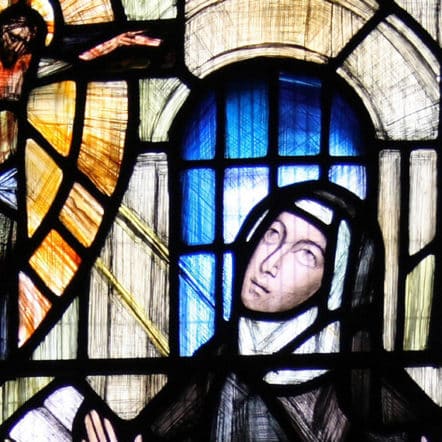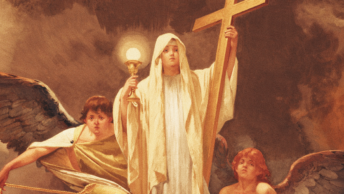There is a story of a young woman who, one evening, was waiting for a bus in a crime-ridden area. A rookie policeman approached her and asked: “Do you want me to wait with you?” Quickly, she noted: “No, that won’t be necessary. I’m not afraid.” To which the young policeman grinned and said: “Well, I am. Would you mind waiting with me?” (Adapted from The Speaker’s Quote Book, Roy B. Zuck)
I begin with this story because our readings for the Twelfth Sunday in Ordinary Time (Jeremiah 20:10-13; Psalm 69; and Romans 5:12-15) have a similar theme running through them: Fear that subsides with companionship.
In our first reading, the Prophet Jeremiah (20:10-13) experiences the feelings of those who step out in God’s name—to speak the truth. To paraphrase and modernize that which may have been rumbling around inside Jeremiah’s head: “Ok, Lord, now that I’ve spoken your truth, look at the mess that I’ve gotten myself into.” Although Jeremiah experiences fear (as we all do), he doesn’t allow it to “rule his world.” Rather, he walks through it and once more places his trust in the Lord.
The Psalmist (#69), also, bears a similar and fearful experience.
For your sake I bear insult, and shame covers my face. I have become an outcast to my brothers, a stranger to my mother’s children, because zeal for your house consumes me, and the insults of those who blaspheme you fall upon me.
In our day and age, perhaps the Psalmist’s words would be these: “Lord, if only I had kept my mouth shut, everything would be—copacetic!” For a split moment, the Psalmist might have been tempted to think these thoughts, but we know where he placed his trust: “Lord, in your great love, answer me.”
So far, we’ve encountered a fearful police officer (whose fears subsided through human companionship) as well as an Old-Testament Prophet and Psalmist who made the decision to place their fears in the hands of the Lord and to trust that, in Him, all would be well.
In his Letter to the Romans (5:12-15), St. Paul provides us with the rationale for trusting in the Lord:
For if by the transgression of the one the many died, how much more did the grace of God and the gracious gift of the one man Jesus Christ overflow for the many.
All of this leads us to our Gospel passage (Mt 10:26-33) where, in the very first verse, Jesus said to the Twelve: “Fear no one…” Our Lord then tells them to be wary not of those who can kill the body, but rather of those who can kill both the body and soul. And then Jesus provides us insight regarding our behavior as faithful Christians:
Everyone who acknowledges me before others, I will acknowledge before my heavenly Father. But whoever denies me before others, I will deny before my Heavenly Father.
A good friend of mine likes to remind me that “we Christians need to be bold, speak out, speak the truth, and make known to those we meet that we are with the Lord—and that He is with us.” He reminds me of the bold accounts of the Christian martyrs in the Acts of the Apostles who joyfully were willing to speak out for they knew that the victory had been won and that Jesus was risen from the dead!
Can the same be said for you and me?
As our culture continues on its path of anti-Christian secularization, living out our faith in the public square requires courage. Today, with powerful voices surrounding us, how many of us are willing to stand up and speak out when, little by little, our Catholic Christian faith is derided and attacked? Are we like those early Christians who proclaimed that Jesus is Lord amidst Godless rulers? Or, have we thrown in the proverbial towel and rationalized that it is no longer worth the fight?
In our day, we are fearful of many things that come into our lives. While COVID-19 has impacted the entire world, many other problems confront the People of God: unemployment, economic woes, marital problems, those who are hungry, those who are sick, and those who are dying.
The list of our problems goes on and on. If we allow them to, they have the potential to suffocate us. But if we look at them through a Christian lens, we see hope. With Jesus, our Lord and companion at our side, we can encounter our challenges and difficulties with divine confidence.
Regarding the Christian life and our human struggles with fear and trust in the Lord, perhaps the great 14th century mystic, Julian of Norwich, summed it up best when she said: “All shall be well, and all shall be well and all manner of things shall be well.”








